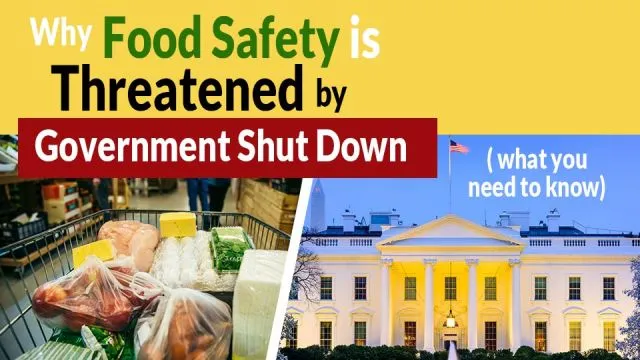
- Share on Facebook161
- Share on Pinterest
- Share on Twitter
Our food safety system has enough leaks when operating at full speed. Take the latest Romaine lettuce scares, for example. Some people are really concerned about what is going to happen if the partial federal strike continues any longer.
According to the Alliance for A Stronger FDA, a non-profit organization that has been challenging issues having to do with food safety in Washinton D.C. for over ten years, the partial shutdown is not something to be taken lightly when it comes to food safety.
The Good News
Now, on day 18 of the strike, there are some things to be thankful for. Here they are:
- The Centers for Disease Control and Prevention is still up and running
- The USDA’s Food Safety and Inspection Service (FSIS) are still working to inspect food in more than 6,200 meat and poultry facilities.
- Many Food and Drug Administration employees are not furloughed because of essential functions such as investigations and imports.
- Local health departments are the front line defense against foodborne illness. These 2,700 agencies are local and state-funded, so they are still in action to protect consumers.
The Not so Good News
If Friday arrives and the government is still on strike, this will be the longest strike in history, and this has implications for food safety.
The Alliance provided a five-page “toolkit” for the media in which they suggest that food safety is going to crumble.
“We know that food safety will be particularly hard hit, including the furloughing of workers in charge of routine inspections, guidance development and also, we assume from staffing training and technical assistance programs (such as) assistance to industry in complying with the FSMA requirements.”
Limited FDA Involvement
There are limited activities in which the FDA can participate during the strike including:
- Addressing imminent threats to the safety of human life
- Activities that are funded by carryover funds, notably but not exclusively, user fees.
The following was published in the Association for a Stronger FDA, “toolkit”
Who is not working at the FDA?
- 41% (7,053) of the agency employees are furloughed.
- Most individuals involved in the development of regulations or the conduct of administrative or policy work are furloughed. We understand there may be a small number of exceptions for guidance development that can be paid for with user fees.
- FDA has specifically said that the OTC monograph process will not be operating unless there is an emergency situation. Our understanding is the same for cosmetics, dietary supplements, food additive petitions, and nutrition programs, among others.
- Food programs (nearly 5,000 employees of CFSAN and CVM) are thinly-staffed, apart from import inspectors, individuals working on recalls, and other front-line employees needed to address essential duties that protect human and animal health and safety.
- Along with those furloughed, we expect that contract employees and contractor firms, to the extent they are paid with appropriated monies, will mostly be on “stop work” orders. While there is a reasonable expectation that FDA employees will eventually be paid their salaries for the shutdown period, there is no such expectation for contractors.
What this means for consumers
According to Wayne Pines, Vice President of the Association for a Stronger FDA,
“The FDA regulates products that make up twenty percent of consumer spending. Despite that, forty percent of FDA’s workforce has been shut down because of an unrelated issue in an appropriations bill that doesn’t involve FDA. The Alliance will now redouble our efforts to make sure that policymakers and the public understand that FDA provides public health services that are core functions of government. When FDA is unable to perform them, the public is at unnecessary risk.”
If ever there was a great time to simplify your shopping for fresh food and shop local it is now! With the strike continuing it will be far too easy for something dangerous to slip between the cracks!
-The Alternative Daily
- Share on Facebook161
- Share on Pinterest
- Share on Twitter

